Cliquez ici
Click here
BIOGRAPHIES
Opening by the Royal Academy of Science, Letters and Fine Arts of Belgium
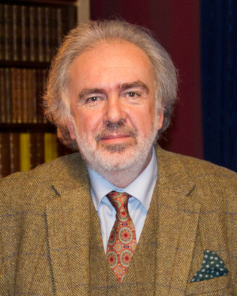
Didier Viviers
Permanent Secretary of the Royal Academy of Sciences, Letters and Fine Arts of Belgium
Historian and archaeologist, specialist in Greco-Roman antiquity, Didier Viviers is a professor at the Université libre de Bruxelles (ULB). Within this institution, he held the position of Rector from 2010 to 2016. He chairs the Board of Directors of the French Network of Institutes of Advanced Studies and the Scientific Council of the French School of Athens; he sits on the Board of Directors of the Casa de Velázquez (Madrid). Didier Viviers is also the Secretary General of the International Academic Union (IAU)..
Opening: Strengthening scientific cooperation between Africa and Europe, a major strategic challenge for meeting the common challenges of the 21st century

Valérie VERDIER
CEO of IRD
Chairwoman of the board & CEO of the Institute of Research for Development (IRD) since February 2020. She promotes a “science of solutions”, where transdisciplinary knowledge and local knowledge are co-constructed with scientific communities and societies in the South.
A biologist recognized internationally for her scientific contributions, particularly in the area of food security, she is pursuing, as head of the IRD, the ambition to collectively combine the preservation of ecosystems with the sustainability of human activities and the development of societies.
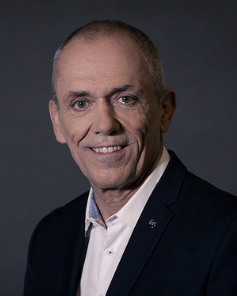
Antoine PETIT
CEO of CNRS
President and CEO of the CNRS. He holds a degree in mathematics and a doctorate in computer science from the University of Paris Diderot. He was deputy director of the Ministry’s Research Directorate, in charge of mathematics and information systems in the southwest region. In 2006, he joined Inria to manage the Paris-Rocquencourt research center, before being appointed Deputy Director General. In 2014, he became President and CEO of Inria.
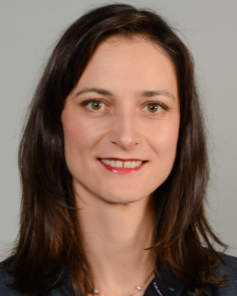
Mariya GABRIEL
European Commissioner for Innovation, Research, Culture, Education, Youth and Sport.
Under her leadership, the new Horizon Europe,Erasmus+, and the cultural strand of Creative Europe programmes (2021-2027) will be defined and implemented.
Between 2017 and 2019, Mariya Gabriel was European Commissioner for Digital Economy and Society. She was elected as Member of the European Parliament (MEP) in 2009, 2014 and
2019. Mariya Gabriel is First Vice-President of the European People’s Party (EPP), and, since 2012, Vice-President of EPP Women.Commissioner Gabriel is a board member of the United Nations youth programme Generation Unlimited (GenU).
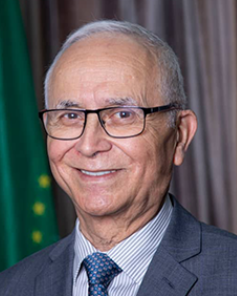
Mohammed BELHOCINE
African Union Commissioner for Education, Science, Technology and Innovation
Commissioner for Education, Science, Technology, and Innovation Former Head of the Department of Internal Medicine, he held various positions in Algeria, at the Faculty of Medicine and the Ministry of Health, before joining the international civil service in 1997. Former Director of the Division of Non-Communicable Diseases at the WHO Regional Office for Africa, he was also UN System Coordinator and UNDP Resident Representative in Tunisia.
Round table 1: What tools do we need for equitable and sustainable cooperation?
moderated by Maryline FIASCHI
Abdoulaye DABO
Former Director General of CNRST Mali
An academic at the Malaria Research and Training Center (MRTC) of Bamako, Mali, he was granted a post-graduate degree in Parasitology/Malacology in 1990 and of a PhD in Parasitology in 2009. Author of more than 50 scientific articles and book chapters, he acted as Director General of the National Centre for Scientific and Technological Research (CNRST) from 2017 to 2021.
Fadila BOUGHANEMI
Deputy Head of the Asia, Africa, MENA and External Relations Unit at the European Commission
Deputy Head of Unit F2, “International Cooperation-Asia, Africa, Middle East and External Relations” at the European Commission’s Research and Innovation Directorate-General. Among other activities, she coordinates the work of the Africa team, responsible for strengthening scientific cooperation with the continent, and is in charge of synergies between the European Union’s science and foreign policies. She joined the European Commission in 1996 as a Scientific Officer in the socio-economic research programme of the R&I Directorate General. In 2004, she joined the international scientific cooperation programme of the R&I DG as Desk Africa, then Desk Mediterranean.
Fulufhelo NELWAMONDO
CEO of National Research Foundation of South Africa
CEO of the National Research Foundation of South Africa, he has held senior positions at the Council for Scientific and Industrial Research, and has served on several boards, councils, departmental task forces and advisory committees. In 2017, he was awarded the Silver Order of Mapungubwe, the highest civilian honour bestowed by the President of the Republic of South Africa. He has worked in the areas of advanced modeling, information security, data science and artificial intelligence at the University of Johannesburg’s Institute of Intelligent Systems.
Kathrin Maria SCHERR
Managing Director of the Max Planck Foundation and Head of Subsharan Africa Operations
Head of Sub-Saharan Africa Operations as well as one of the Managing Directors at the Max Planck Foundation for International Peace and the Rule of Law (MPFPR). Kathrin Scherr is responsible for designing and implementing rule-of-law projects in Sub-Saharan Africa that support ongoing constitutional processes and contribute to stabilise legal systems through legal advice and the provision of legal capacity-building programmes. Kathrin Scherr holds a PhD in Comparative Public Law from the European University Institute (EUI), Florence, and an M.A. in International Relations and International Economics from Johns Hopkins University, Washington DC.
Round table 2: Mobility, a fundamental issue for scientific excellence
moderated by Maryline FIASCHI
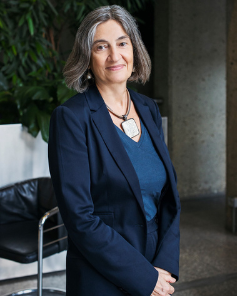
Béatrice KHAIAT
Deputy Director General of Campus France
Deputy Director General of Campus France. Béatrice Khaiat has served two terms at the head of Campus France. She previously worked in ministerial cabinets, at the Ministry of Education and Higher Education from 1997 to 2000 and at Matignon from 2012 to 2014. She was assistant to the secretary general of the French presidency of the European Union from 2007 to 2009 and was director of the EduFrance Agency from 2000 to 2012. Béatrice Khaiat is a Knight in the National Order of the Legion of Honor and an Officer in the National Order of Merit.
Patrick LEVY
Member of the Board of European University Association
A Professor of Physiology, MD, respiratory physician, he graduated with a master’s degree in animal Physiology (1986) and a PhD in Physiology (1989). He set up and headed the Hypoxia Pathophysiology Laboratory (HP2) at Université Grenoble Alpes, Inserm (2003-2015), one of the most active research laboratories on Obstructive Sleep Apnea worldwide. He was President of Université Joseph Fourier in Grenoble (2012-2015) and then of Université Grenoble Alpes (2017-Jan), leading the ambitious “Université Grenoble Alpes – Initiative of Excellence” project, aimed at establishing a large research and multidisciplinary University in Grenoble and the Alps. This establishment saw the light of day in 2020, reaching critical mass and improving its international visibility. Patrick Levy was also elected to the Board of the European University Association (2019-23).
Bakri OSMAN SAEED
President of the Association of African Universities (AAU)
President of the Association of African Universities (AAU), President of the Sudan International University and UNESCO Chair in School Health Education-Sudan. He previously worked for many years as an academician and medical consultant for the University of Leicester, the University of Newcastle-upon-Tyne, the University of London (UCL) and the United Nations University for Peace.
Roger TSAFACK NANFOSSO
Rector of the University of Dschang
Associate Professor of Economics and Rector of the University of Dschang (Cameroon), he is a teacher, lecturer and consultant in several universities and international institutions in Africa and Europe. He is the author of numerous publications and a member of a dozen learned societies as well as the Cameroon Academy of Sciences. He is President of the Network of Higher Education and Research Institutions of Central Africa (REESIRAC), and Secretary General of the International Association of French-speaking Economists (AIELF). He is a Knight of the French Palmes Académiques, Commander of the National Order of Valour of Cameroon, and Knight of the Academic Palms of the International Order of CAMES.
Manuel TUNON DE LARA
President of France Université
President of France Universités since 2020, he was clinical director and became university professor and hospital practitioner in 1995 in the respiratory diseases department at Bordeaux University Hospital. From 1998, he was involved in the institutional life and more particularly in the international activities of the University of Bordeaux Segalen. In 2001, he took over the management of the European Affairs and International Relations Department. Elected President of the University of Bordeaux Segalen in 2008 and re-elected in 2012, he was then appointed President of the University of Bordeaux in 2014 and re-appointed in 2019. Since 2008, he has been a member of the Health Committee and served as Vice Chair and then Chair in 2018.
Inspiring talk: Rethinking the relationship between Africa and Europe, for an equitable and sustainable research partnership
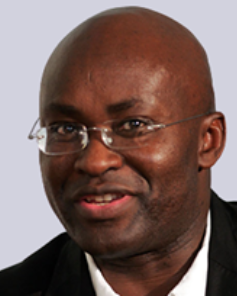
Achille MBEMBE
Teacher, historian and political scientist, University of the Witwatersrand
A philosopher and historian, he teaches history and political science at the University of the Witwatersrand (South Africa) and at Duke University (United States). He holds a DEA in political science from Sciences Po Paris and a doctorate in history from the Sorbonne. He has taught at several American universities (Columbia, University of Pennsylvania, Berkeley and Yale) and has directed the Council for the Development of Social Science Research in Africa in Dakar.
Inspiring talk: The development of scientific research and culture in Africa
Francine NTOUMI
Professor at the University of Tübingen (Germany) and President of the Congolese Foundation for Medical Research in Republic of the Congo
Molecular epidemiologist, President of the Congolese Foundation for Medical Research, Professor at the Institute for Tropical Medicine of the University of Tübingen in Germany. The first African woman to head the secretariat of the Multilateral Initiative on Malaria, Francine Ntoumi is very active in strengthening the health research capacity of the African continent. This commitment has led her to coordinate the Central Africa Clinical Research Network of Excellence on Tuberculosis, HIV/AIDS, and Malaria (CANTAM) and the pan-African PANDORA-Id-Net. She is President of the Scientific Council of the IRD and a member of numerous international scientific committees (African Union, WHO, Africa-CDC, Bill and Melinda Gates Foundation).
Round Table 3: Building sustainable partnership networks
moderated by Maryline FIASCHI
Emmanuel ADU-DANSO
Consultant at the African Research Universities Alliance (ARUA)
Consultant to the African Research Universities Alliance (ARUA) on the ARUA-Carnegie Benchmarking Project. Prior to this, he worked closely with the Secretary General as Network Manager to forge several partnerships with universities, university associations, funding agencies and other collaborating institutions. He is a development economist by training and holds an academic position at the Department of Economics of the University of Ghana.
Rigas ARVANITIS
Research Director at IRD and Director of CEPED
Director of Research at the IRD and Director of the UMR Population and Development Centre (Ceped), at Université Paris Cité-IRD. Having spent more than twenty years abroad (Latin America, China, Lebanon), he has developed research work on the formation of scientific communities in the South, scientific collaborations, research-industry links and technological learning of companies and innovation, research and innovation policies. In collaboration with Sari Hanafi, he has recently published Knowledge production in the Arab world: the impossible promise, Routledge. His latest project concerns research collaborations and funding in the Sahel countries (SAFIRE, AFD-funded project). He was editor and co-founder of the “Revue d’anthropologie des connaissances”.
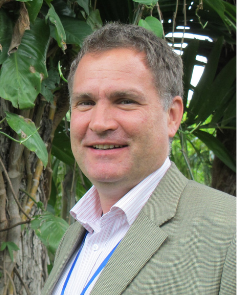
Ezra CLARK
Chief of Section for Science Technology and Innovation Policy and currently Director a.i. of the Division of Science Policy and Basic Science
Dr Ezra Clark is the Chief of Section for Science Technology and Innovation Policy (STIP) and currently Director a.i. of the Division of Science Policy and Basic Science (PCB), in the Natural Sciences Sector of the United Nations Educational, Scientific and Cultural Organization (UNESCO). Prior to this Ezra worked for the United Nations Environment Programme (UNEP) for 14 years in the field of ozone and climate under the Montreal Protocol. Ezra holds PhD in Freshwater Ecology and Hydrology from Exeter University, United Kingdom.
Lydie HAKIZIMANA
CEO of the African Institute for Mathematical Sciences (AIMS) Global Network
Director General of the African Institute for Mathematical Sciences (AIMS). As founder and CEO of Drakkar Ltd, a pioneering Rwandan educational publishing house, Lydie Hakizamana has over 10 years of experience in textbook production and distribution. She founded Happy Hearts Preschools in 2015 to provide quality preschool education to all. She previously worked for OTF Group, a Boston-based consulting firm that advised the governments of Rwanda and Gabon in the areas of information and communication technology, as well as the hides and wood industries. She is the recipient of numerous awards, including the “Prix de la Femme francophone de l’année” in 2021, the Mandela Washington Fellowship Award in 2016 and the Archbishop Desmond Tutu Fellowship in 2013. She is on the board of the African Leadership University.
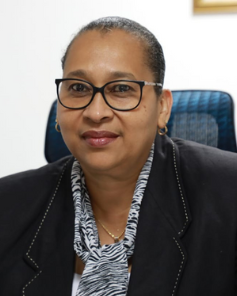
Véronique YOBOUE
Vice-President in charge of cooperation at Félix-Houphouët-Boigny University
Professor of Universities and Vice President in charge of planning, programming and external relations of the University Félix Houphouët Boigny (UFHB). She graduated in 1991 with a PhD in Environmental Physics and Chemistry from Paul Sabatier University, Toulouse, France. Expert in air pollution and its impacts, she has spent 29 years in the service of Education, Training and Research. She is also a teacher-researcher at the UFHB and national coordinator of several European, French and Franco-Ivorian research projects.
Inspiring talk: Focus on an International Research Laboratory in West Africa: the “Environment, Health and Societies” Laboratory.
Lamine GUEYE
Director of the international research laboratory “Environment, Health, Societies”
Fireside chat: The place of women in research in Africa and Europe
moderated by Maryline FIASCHI
Aïda HAMDI
General Delegate of the UNESCO Chair for Women in Science at Paris-Dauphine
Adolé Isabelle GLITHO-AKUESON
Chair of the UNESCO Committee on Women, Science and Sustainable Water Management in West and Central Africa and member of the African Academy of Sciences
Inspiring talk: Thinking about the future of the African continent through the valorisation of research
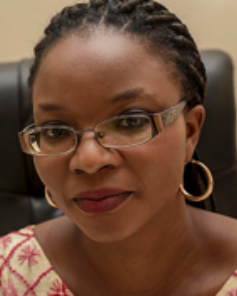
Mame-Penda BA
Teacher-researcher at the Gaston Berger University in Senegal and editor-in-chief of the new scientific journal “Global Africa”
Associate Professor of Political Science at the Gaston Berger University of Saint-Louis, Senegal.
She was special advisor to the Rector and Deputy Director of the Law and Political Science Department. She is the Director of the Research Laboratory on Societies and Powers in Africa/Diaspora (LASPAD) and the Executive Secretary of the African Studies Association for Africa (ASAA). She is a member of several international research networks and her work covers the sociology of religion, the analysis of public action and the recomposition of the state in Africa. She is also the editor of the new journal Global Africa and co-editor of the blog CIHA (Critical Investigations into Humanitarianism in Africa).
